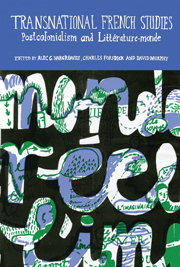Book contents
- Frontmatter
- Contents
- Acknowledgements
- Introduction: What Does Littérature-monde Mean for French, Francophone and Postcolonial Studies?
- From World Literature to Littérature-monde: Genre, History and the Globalization of Literature
- Postcolonialism, Politics and the ‘Becoming-Transnational’ of French Studies
- Mapping Littérature-monde
- Littérature-monde, or Redefining Exotic Literature?
- From Littérature voyageuse to Littérature-monde via Migrant Literatures: Towards an Ethics and Poetics of Littérature-monde through French-Australian Literature
- Littérature-monde and the Space of Translation, or, Where is Littérature-monde?
- Littérature-monde or Littérature océanienne? Internationalism versus Regionalism in Francophone Pacific Writing
- The World and the Mirror in Two Twenty-first-Century Manifestos: ‘Pour une “littérature-monde” en français’ and ‘Qui fait la France?’
- The Post-Genocidal African Subject: Patrice Nganang, Achille Mbembe and the Worldlinesss of Contemporary African Literature in French
- Afterword: The ‘World’ in World Literature
- Appendix: Toward a ‘World-Literature’ in French
- Notes on Contributors
Littérature-monde and the Space of Translation, or, Where is Littérature-monde?
from Mapping Littérature-monde
- Frontmatter
- Contents
- Acknowledgements
- Introduction: What Does Littérature-monde Mean for French, Francophone and Postcolonial Studies?
- From World Literature to Littérature-monde: Genre, History and the Globalization of Literature
- Postcolonialism, Politics and the ‘Becoming-Transnational’ of French Studies
- Mapping Littérature-monde
- Littérature-monde, or Redefining Exotic Literature?
- From Littérature voyageuse to Littérature-monde via Migrant Literatures: Towards an Ethics and Poetics of Littérature-monde through French-Australian Literature
- Littérature-monde and the Space of Translation, or, Where is Littérature-monde?
- Littérature-monde or Littérature océanienne? Internationalism versus Regionalism in Francophone Pacific Writing
- The World and the Mirror in Two Twenty-first-Century Manifestos: ‘Pour une “littérature-monde” en français’ and ‘Qui fait la France?’
- The Post-Genocidal African Subject: Patrice Nganang, Achille Mbembe and the Worldlinesss of Contemporary African Literature in French
- Afterword: The ‘World’ in World Literature
- Appendix: Toward a ‘World-Literature’ in French
- Notes on Contributors
Summary
The question concerning the ‘location’ of a ‘littérature-monde en français’ is not as easily answered as one might first think. One reason for this is that the seemingly obvious answer to the question is tautological and chiasmic: littérature-monde is ‘in’ the ‘world’, and the ‘world’ is ‘in’ it. Or, again, it is purportedly ‘from’ the world over. Indeed, Goethe's epiphany heralding the new era of Weltliteratur in 1827 came to him while reading a Chinese novel translated into German. As Antoine Berman explains it in L'Epreuve de l'étranger, ‘en forçant à peine les choses, on pourrait dire que la langue allemande est devenue parfois pour Goethe la langue-de-latraduction’ (Berman, 1984: 93). To pose the questions, ‘What literature?’, ‘What world?’, ‘In what language?’ is also to pose the question of translation, for it is an activity that is as central to the project of littérature-monde as it is to Weltliteratur, world literature, and littérature mondiale, although it may not always be acknowledged as such. Indeed, it is not too far-fetched to say that Weltliteratur for Goethe was a kind of littérature-monde in German.
Despite this possibility, the relationship between littérature-monde, littérature mondiale, and its German and English-language counterparts Weltliteratur, and world literature is made explicit neither in the manifesto, ‘Pour une “littérature-monde” en français’, nor in the two introductory essays by Jean Rouaud and Michel Le Bris, the editors of the collection of essays by some of the signatories of the manifesto published under the title, Pour une littérature-monde.
- Type
- Chapter
- Information
- Transnational French StudiesPostcolonialism and Littérature-monde, pp. 227 - 239Publisher: Liverpool University PressPrint publication year: 2010

